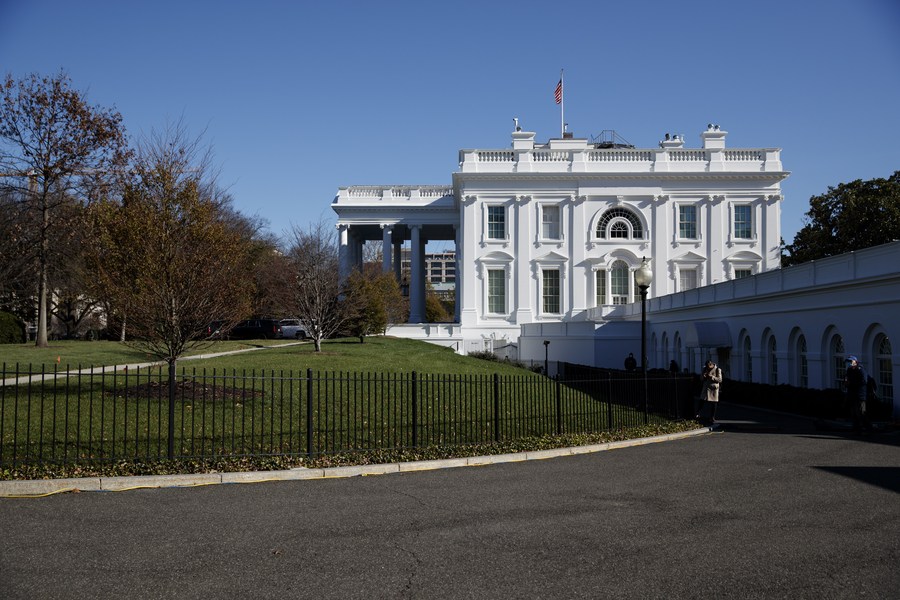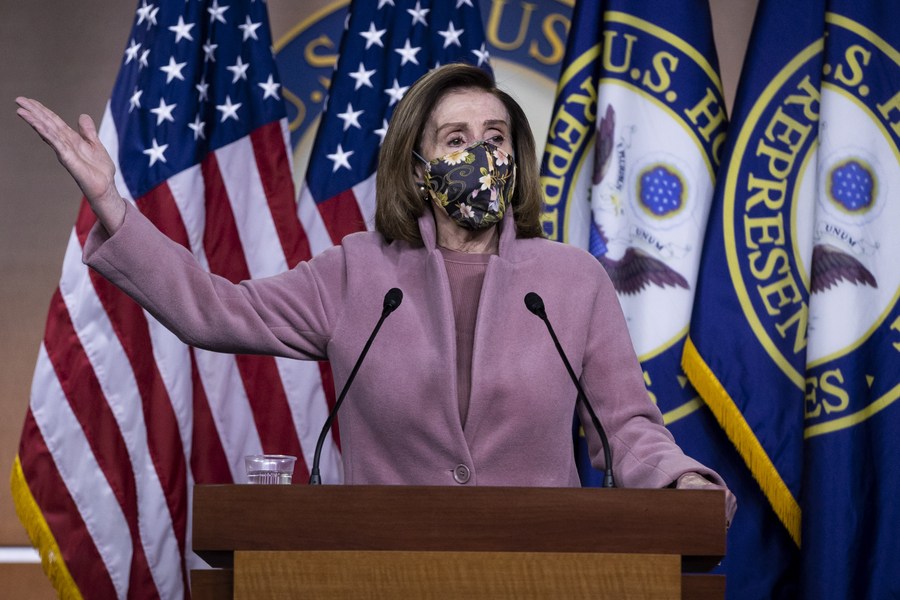


Photo taken on Nov. 23, 2020 shows the White House in Washington, D.C., the United States. (Photo by Ting Shen/Xinhua)
White House officials called the immigration bill a chance to "reset and restart conversations on immigration reform," labeling the bill as President Biden's "vision of what it takes to fix the system."
WASHINGTON, Feb. 18 (Xinhua) -- U.S. President Joe Biden's administration, together with Democratic lawmakers, on Thursday formally rolled out a major immigration bill called U.S. Citizenship Act of 2021, introducing legislations that would expand immigration and give nearly 11 million undocumented immigrants a path to U.S. citizenship in eight years.
White House officials called the bill a chance to "reset and restart conversations on immigration reform," labeling the bill as Biden's "vision of what it takes to fix the system."
The bill includes providing a shorter process to legal status for young people brought to the United States by their parents as children, known as Dreamers.
The bill also triples the number of visas available to those who have been the victim of certain crimes including domestic violence, upping the number from 10,000 to 30,000. Employment-based visas also jump under the bill from 140,000 to 170,000.
It would allow immigrant farmworkers and those with Temporary Protected Status, who came to the United States as far back as the 1990s amid natural disasters and other unrest in their countries of origin, to quickly gain green cards, said a The Hill report.
Under the bill, undocumented people living in the United States would be able to seek green cards after five years, while the three- and 10-year bars that restrict people from reentering the United States if they've overstayed their visas will be lifted.
The bill will make efforts to ease immigration timelines abroad, increasing numerous types of visa caps while seeking to reduce wait times for those who may currently wait as long as 20 years to join family in the country. It also includes an enforcement plan to deploy technology to patrol the U.S. border.
The bill also lays out a plan to create refugee processing in Central America to discourage migrants from trying to travel to the U.S.-Mexico border, while setting aside 4 billion dollars in aid for Guatemala, El Salvador and Honduras to address the root causes of migration.

U.S. House Speaker Nancy Pelosi speaks during a press conference on Capitol Hill in Washington, D.C., the United States, Jan. 21, 2021. (Photo by Ting Shen/Xinhua)
Democrats and Republicans are sharply divided on how to reform the country's immigration system. It remains unclear whether Democrats plan to keep the policy proposals in one large legislative package or try to enact individual elements of it in a piecemeal approach.
"How it happens through the legislative process remains to be seen," House Speaker Nancy Pelosi said of the legislative strategy, "But it is a priority and we will be working on it."
Some Republican lawmakers have already criticized the bill for the timing and failing to address more on border security.
"No! This is not the right time and certainly not the right set of policies," House Republican Bill Johnson tweeted on Thursday. "Let's focus on those Americans who are struggling right now."
Even with a Democratic-led Congress, passing an immigration bill will be a heavy lift given that Senate Democrats would need to secure 10 Republican votes to pass the bill through the regular legislative process.
The last time comprehensive, bipartisan immigration legislation was brought up in U.S. Congress was in 2013, and comprehensive immigration reform hasn't passed in over 30 years in the country, according to a USA Today report.

 Award-winning photos show poverty reduction achievements in NE China's Jilin province
Award-winning photos show poverty reduction achievements in NE China's Jilin province People dance to greet advent of New Year in Ameiqituo Town, Guizhou
People dance to greet advent of New Year in Ameiqituo Town, Guizhou Fire brigade in Shanghai holds group wedding
Fire brigade in Shanghai holds group wedding Tourists enjoy ice sculptures in Datan Town, north China
Tourists enjoy ice sculptures in Datan Town, north China Sunset scenery of Dayan Pagoda in Xi'an
Sunset scenery of Dayan Pagoda in Xi'an Tourists have fun at scenic spot in Nanlong Town, NW China
Tourists have fun at scenic spot in Nanlong Town, NW China Harbin attracts tourists by making best use of ice in winter
Harbin attracts tourists by making best use of ice in winter In pics: FIS Alpine Ski Women's World Cup Slalom
In pics: FIS Alpine Ski Women's World Cup Slalom Black-necked cranes rest at reservoir in Lhunzhub County, Lhasa
Black-necked cranes rest at reservoir in Lhunzhub County, Lhasa China's FAST telescope will be available to foreign scientists in April
China's FAST telescope will be available to foreign scientists in April